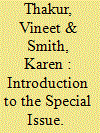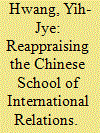|
|
|
Sort Order |
|
|
|
Items / Page
|
|
|
|
|
|
|
| Srl | Item |
| 1 |
ID:
183217


|
|
|
|
|
| Summary/Abstract |
This article explores how International Studies as a scientific discipline emerged and developed in China, against the background of a Sinocentric world order that had predominated in East Asia for a long time. The argument of this article is threefold. First, the discipline relied heavily on historical, legal, and political studies, and placed a heavy focus on the investigation of China's integration into the Westphalian system. Second, studies of International Relations were grounded in a problem-solving approach to various issues China was facing at various times in the course of modernisation. Third, the historical development of International Studies in China has had a profound impact on the current IR scholarship in both the PRC and Taiwan, including the recent surge of attempts to establish a Chinese School of IR theory in China and the voluntary acceptance of Western IR in Taiwan. By way of conclusion, the article suggests that there is still an indigenous Chinese site of agency with regards to developing IR. This agency exists despite the fact that in the course of the disciplinary institutionalisation of IR Chinese scholars have largely absorbed Western knowledge.
|
|
|
|
|
|
|
|
|
|
|
|
|
|
|
|
| 2 |
ID:
183216


|
|
|
|
|
| Summary/Abstract |
Disciplinary histories are, by default, complicit in the production of subjective memories as truth. This Special Issue builds on the existing scholarship on rethinking IR's disciplinary history by expanding its geographical focus beyond the West, and explores how IR came to define itself as a self-contained body of knowledge that is distinct from other fields of study in different parts of the world. These alternative histories enable us to appreciate that the development of IR as a global discipline was only possible through a transnational circulation of key ideas such as sovereignty, empire, Commonwealth and, especially, competing notions of the ‘international’. In addition, they bring attention to the purpose of knowledge and the politics of its production, and allow for both democratisation as well as discursive plurality.
|
|
|
|
|
|
|
|
|
|
|
|
|
|
|
|
| 3 |
ID:
179326


|
|
|
|
|
| Summary/Abstract |
This article aims to revisit the enterprise of the Chinese School (CS) of IR and discuss how it should be viewed and handled in the discipline, specifically from within the analytical framework of the power/resistance nexus put forward by Foucault, Bhabha, and Spivak. The argument of this article is twofold. Firstly, the CS attempts to reinvigorate traditional Chinese concepts (that is, humane authority, the Tianxia system, and relationality), which mimick Western mainstream IR. These concepts channel the CS into a realist notion of power, a liberal logic of cosmopolitanism, and a constructivist idea of relationality. Thus, the CS uses against the West concepts and themes that the West currently use against the non-Western world. Nevertheless, as the second part of the argument will demonstrate, the enterprise of the CS can still be justified because it can be regarded as a reverse discourse; mimicking yet altering the original meanings of the taken-for-granted concepts, ideas, and principles used by mainstream IR scholars. Moreover, with the judicious use of strategic essentialism, the CS can potentially be one local group in a wider effort to contest diffused and decentred forms of Western domination through linking various struggles to form a unified ‘counter-hegemonic bloc’ of post-Western IR in the discipline.
|
|
|
|
|
|
|
|
|
|
|
|
|
|
|
|
|
|
|
|
|